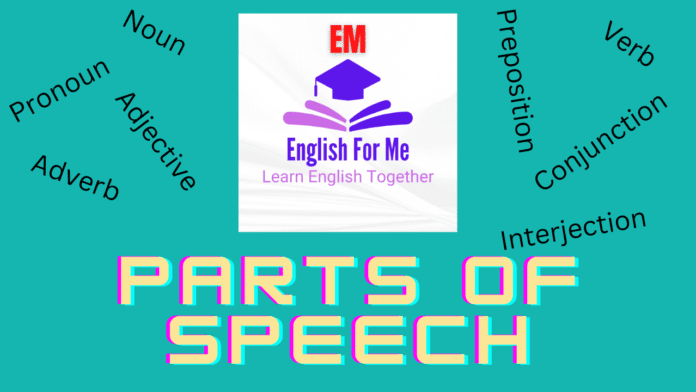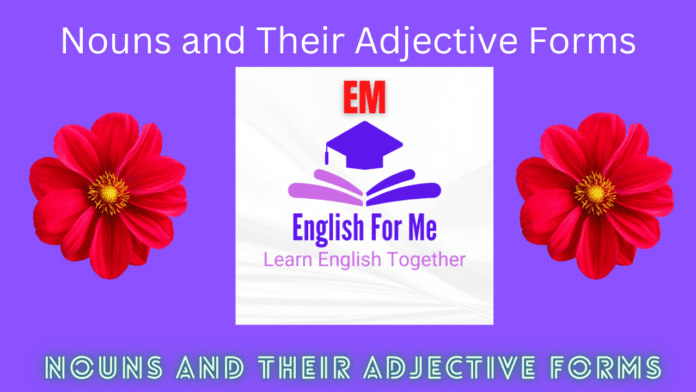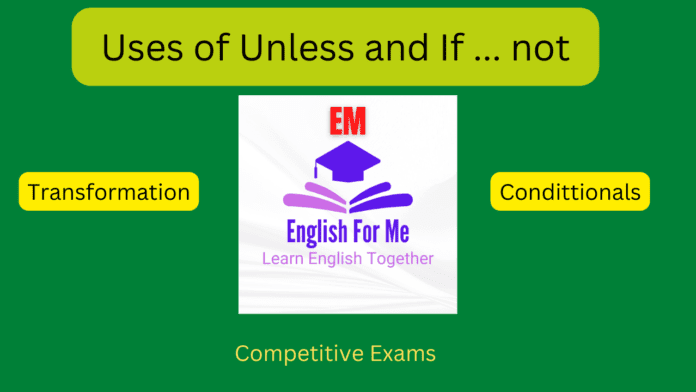THE EIGHT PARTS OF SPEECH
There are eight parts of speech in the English language: 1) Noun 2) Pronoun 3) Verb 4) Adjective 5) Adverb 6) Preposition 7) Conjunction 8) InterjectionThe part of speech indicates how the word functions in meaning as well as grammatically within the sentence. An individual word can function as more than one part of speech when used in different circumstances. Understanding parts of speech is essential for determining the correct definition of a word when using the dictionary.
The Eight Parts of Speech
1.NOUN नाम
: Noun is an important Parts of Speech. व्यक्ती, वस्तु व ठीकाणाला दिलेले नाव म्हणजे नाम होय. A name of person, place and thing is noun.EXAMPLE: Krishna, teacher, book, room, river, rose, lion, village, Gadchandur, apple, hen, courage, freedom, education, management, happiness, length, womanhood, man, peace, Marathi, Physics, Economics, Commerce, temple,hand, tree, Maharashtra, India, Asia, Stadium. etc
A: Functions of Noun: नामाची कार्ये
1) As a subject / doer of action कर्ता म्ह्णुन a) A teacher teaches a lesson.
b) Students read books.
c) India is a developed country.
d) Treesgive us shade.
2) As an Object कर्म म्ह्णुन
a) Human body needs nutrients.
b) We learn grammar.
3) As a Compliment पुरक शब्द म्ह्णुन.
a) He is a teacher.
b) We are students.
c) An apple is afruit.
d) He is a shopkeeper.
B: KINDS OF NOUN :
1. Proper Noun, 2. Common Noun, 3. Abstract Noun. 4. Collective Noun
1.Proper Noun विशेष नाम : व्यक्तीला, ठीकानाला दिलेले विशीष्ट नाव म्ह्णजे Proper Noun होय. Examples : Mayank, Anagha, Korpana, Akola, Chandrapur, Mukutban, Irai, Ganga, Manikgarh, Himalaya, Maharashtra, India, Wani, Yavatmal ( पहिले अक्षर capital लिहावे)
2. Common Noun सामान्य नाम : Examples : boy, girl, man, woman, village, city, town, river, fort, mountain, state, nation
3.Abstract Noun अमुर्त नाम : Examples : birth, charity, bravery, courage, patience, nationality, knowledge, advice, entertainment, beauty, calmness, prevention.
4.Collective Noun समुह नाम : Examples : crowd, class, fleet, army, platoon, swarm, flock
2. PRONOUN सर्वनाम
: The Parts of speech (pronoun) is used instead of noun. नामाच्या ऎवजी वापरलेल्या शब्दाला pronoun म्ह्णतात. ( A word used instead of noun is pronoun.)I हे प्रथम पुरुषी सर्वनाम स्वत:साठी वापरल्या जाते. We स्वत:सह इतरासाठी वापरल्या जाते. You हे द्वीतीय पुरुषी सर्वनाम ज्याच्यांशी बोलतो त्याच्यांसाठी त्यांच्या नावाऎवजी वापरल्या जाते. He, She, It, They हे त्रुतीय पुरुषी सर्वनामे ज्यांच्याबद्द्ल बोलायचे असते त्यांच्यासाठी वापरल्या जाते.
| Kinds of Pronoun सर्वनाम प्रकार | Subject कर्ता | Object कर्म | Possessive मालकीदर्शक |
|---|---|---|---|
| First Person Singular प्रथम पुरुषी एकवचनी | I मी | me मला | my माझे |
| First Person Plural प्रथम पुरुषी अनेकवचनी | We आम्ही | us आम्हाला | our आमचे, ची, चा |
| Second Person Singular/Plural व्दितीय पुरुषी एक/अनेकवचनी | You तु, तुम्ही | you तुला, तुम्हाला | your तुमचे, ची, चा |
| Third Person Singular त्रुतीय पुरुषी एकवचनी | He तो | him त्याला | his त्याचे |
| Third Person Singular त्रुतीय पुरुषी एकवचनी | She ती | her तीला | her तीचे, चा |
| Third Person Singular त्रुतीय पुरुषी एकवचनी | It ते | it ते | its त्याचे, चा |
| Third Person Plural त्रुतीय पुरुषी अनेकवचनी | They ते, त्या | them त्यांना | their त्यांचे, चा |
Observe the usage of pronoun and its forms.
I am a student. My name is Ankit. My mother’s name is Reshma. She is a teacher. I help her in household chores. Her school is far from our home. My father’s name is Kamlakar. He is a doctor. His hospital is very big. Patients consider him a very good doctor. My parents are very kind. They love me very much. You also will like them. We have a car. It is dusky brown.
3.ADJECTIVE विषेशण
: नाम किंवा सर्वनाम या विषयी माहिती देणार्या शब्दाला विषेशण म्ह्णतात. (A word that tells something about noun or pronoun is known as Adjective. Adjective is a third parts of speech that we need use very carefully.)Examples: poor student sick people, weak people, blind musician, brave men courageous soldier, dangerous path, green field, joyful ride, narrative passage, national leader, spoken language, interesting film
विशेषणांची superlative आणि comparative रुपे पुढील प्रमाणे आहे.
| Positive Adj. | Comparative Adj. | Superlative Adj. |
|---|---|---|
| rich | richer | richest |
| short | shorter | shortest |
| wise | wiser | wisest |
| large | larger | largest |
| big | bigger | biggest |
| cruel | crueller | cruellest |
| fat | fatter | fattest |
| easy | easier | easiest |
| pretty | prettier | prettiest |
| mighty | mightier | mightiest |
| attractive | more attractive | most attractive |
| important | more important | most important |
| powerful | more powerful | most powerful |
| good | better | best |
| bad | worse | worst |
4.VERB क्रियापद
: क्रियादर्शक शब्द म्हणजे क्रियापद होय. ( A word that denotes an action is called verb. A verb is also another parts of speech. )EXAMPLES: apply, bend, come, decide, enable, fight, inform, jump, kick, lie, make, nourish, opine, pamper, quit, run, stop, tie, unite, vanish, wash, yawn,
वाक्याचा काळ आणि कर्ता लक्षात घेवुन क्रियापदाचे विवीध रुपे वापरावे लागतात. ती रुपे साधारणपणे पाच आहेत.
| V1 | Past Form V2 | Past Participle V3 | V4 | V5 |
|---|---|---|---|---|
| take | took | taken | taking | takes |
| play | played | played | playing | plays |
| read | read | read | reading | reads |
| catch | caught | caught | catching | catches |
| win | won | won | winning | wins |
| see | saw | seen | seeing | sees |
| fly | flew | flown | flying | flies |
क्रियापदाचे रुपे आणि त्यांचे उपयोग
6. ADVERB
: क्रियापद किंवा विशेषण याबद्दल माहिती देणारा शब्द म्ह्णजे क्रियाविशेषण Adverb होय. (A word that describes a verb or adjective is called Adverb.)क्रिया कशी घडली/घडते हे सांगण्याचे काम Adverb करते. विशेषणास ly हे प्रत्यय लावुन adverb तयार केल्या जात Example : joyfully, skillfully. courageously, fast, very, naturally, cleverly, happily, sadly, slowly, easily, bravely, simply, brightly.
7. PREPOSITION
: नामाच्या पुर्वी येणार्या व दुसर्या शब्दाशी त्या नामाचा संबंध व्यक्त करणार्या शब्दास Preposition म्ह्णतात. (A preposition is a word placed before a noun to show its relation with other word.)Examples of Prepositions
- in-आत
- Mother is in the kitchen.
- There are seven days in a week.
- We live in Chandrapur district.
- Mahatma Gandhi was born in 1869.
into-च्या आत (वेगाने) - He jumped into the river.
on-च्या वर(स्पर्श करुन) ,ला - A book is on a table.
- We celebrate Christmas on 25 December.
- He was absent on Monday.
over-च्या वर (स्पर्श नसुन) - A fan is over our head.
under-खाली - A cat is under a table.
between-दोघांच्या मध्ये - B is between A and C.
among अनेकाच्या मध्ये - The teacher is standing among the students.
for साठी - I bought a doll for her. of चा, ची, चे
- This is a pen of Jayant.
at-कडे, ला - We live at Korpana.
- I get up at 5:30 A.M.
beside च्या बाजुला - Sit beside me.
with च्या सह - Come with me.
- Cut with knife.
by ने, च्या कडुन - Trees are cut with axe by people.
- We travel by bus.
to च्या कडे, ला - We go to school.
up वरच्या दिशेने - The dog is looking up.
down खालच्या दिशेने - They came down the hill.
fromच्या पासुन - Chandrapur is 25 kms. form Rajura.
acrossच्या पलीकडे - They sail across the ocean.
throughच्या मधुन - The thief entered through the window.
behindच्या मागे - My house is behind the post-office.
off च्या पासुन दुर - The students of our school ran off the road.
रिकाम्या जागेत Preposition भरतांना वाक्याचा अर्थ व Preposition चा अर्थ लक्षात घ्यावा.
- Our prayer starts_____ 7:10 A.M (at, on)
- The plane flew _____our village.(over, on)
- We have holiday ____ Sunday.(on, at)
- He was arrested ____ police.(by, from)
- 2 is _____1 and 3.(in , between)
- There are 30 days __a month.(on/ in)
- We write ___a pen. (with, by)
- He took a pencil___Jaya. (of, Off)
- He went ___Mumbai.(to, on)
- We buy things ____ shop.(in, from)
- India got freedom in 1947.
- The train arrived at 10 O’clock.
- The TajMahal was built in Agra.
- Mahatma Gandhi was born at Porbandar in Gujrat.
- India’s Constitution was implemented on 26th of January 1950.
- They set up a tent on hill.
- They sailed across the ocean.
- The bus moved along the road.
- The boys threw stones at the frog.
- Mother is in the kitchen.
7. Conjunction
A conjunction is an important parts of speech that joins words, phrases, or clauses. and, but, or, while, because, if, so..that, unless, too..to, A conjunction joins words, phrases, or clauses, and indicates the relationship between the elements joined. Coordinating conjunctions connect grammatically equal elements: and, but, or, nor, for, so, yet. Subordinating conjunctions connect clauses that are not equal: because, although, while, since, etc. There are other types of conjunctions as well.8. Interjection
An interjection is a word used to express emotion. Interjection is a eighth parts of speech Oh!… Wow!… Oops! Bravo! An interjection is a word used to express emotion. It is often followed by an exclamation point.After studying parts of speech we are ready to check our understanding about the parts of speech in English. Solve the given online test based on your understanding.
Test on Parts of Speech
















